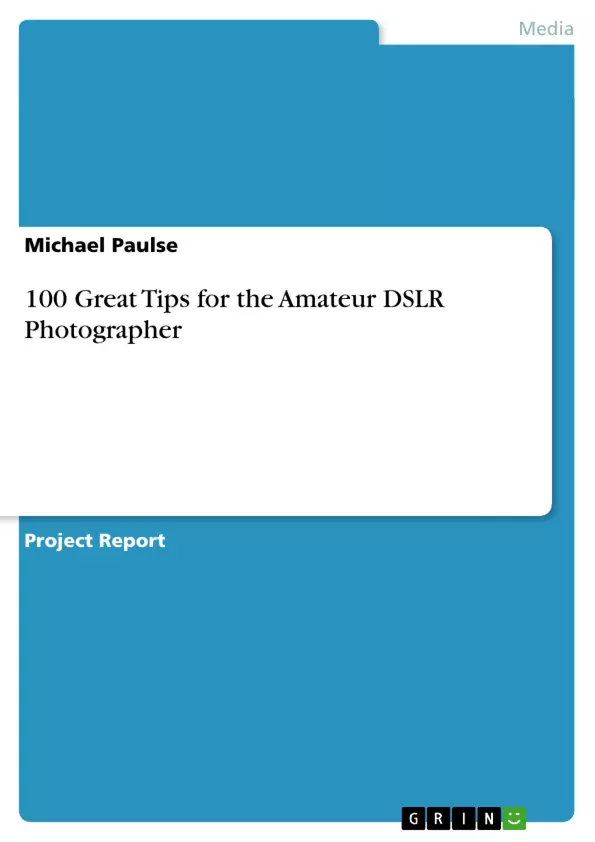100 Great Tips for the Amateur DSLR Photographer
The Cape Town Best Seller e-Book Series
International Edition
100 Great Tips for the Amateur DSLR Amateur Photographer addresses the basic ‘must know’ and ‘need to know’ tips to get you going with your DSLR (digital single-lens reflex) camera. It is written in a language that is easy to understand and cuts to the chase. No complicated technical jargon, or sequential training methodology. My method is one of emersion – YOU are thrown in at the deep end! YOU, the learner and aspirant photographer, yes YOU, decide the pace, the topic or tip, the duration of practice, etc. And it is all demonstrated in clear photographs that illustrates the underlying tip. Just page to the topic of interest and ‘Voila!’, it is explained in one or five (?) printable and descriptive photographs! Take this with you and go and practice it. There are 100 easy to understand tips – all beautifully illustrated by yours truly in about 190 or so photographs covering all the issues you need to get you going and truly enjoy this fine art form. Topics include studio work, panning, spot metering, nudity, z-cards, low light photography and host of other topics. You'll love it!
Michael Paulse (AUTHOR)
Inhaltsverzeichnis (Table of Contents in English)
- Preface
- Introduction
- The Research Field
- Key Terms and Concepts
- Objectives and Research Questions
- Research Methods
- Structure of the Work
- Theoretical Foundations
- The Role of the Media in Society
- Theories of Media Effects
- The Impact of the Internet and Social Media
- The Concept of Digital Literacy
- Empirical Findings
- The BiLieF Project
- Research Design and Methodology
- Results and Discussion
- Further Empirical Research
- Implications and Recommendations
- Policy Recommendations
- Educational Recommendations
- Recommendations for Future Research
- Conclusion
Zielsetzung und Themenschwerpunkte (Objectives and Key Themes in English)
This work aims to explore the role of digital literacy in navigating the complexities of online information. It examines the relationship between media use, critical thinking skills, and the ability to effectively engage with online content. The research draws upon empirical findings, particularly from the BiLieF project, to assess the current state of digital literacy and its implications for society. Key themes and main ideas from the text include:- The changing media landscape and the rise of digital information.
- The importance of developing critical thinking skills to navigate online content.
- The BiLieF project and its insights into the relationship between digital literacy, media consumption, and critical thinking.
- The challenges and opportunities associated with digital literacy in the contemporary world.
- Recommendations for enhancing digital literacy through educational and policy initiatives.
Zusammenfassung der Kapitel (Chapter Summaries in English)
- Preface: Introduces the topic of digital literacy and its significance in the modern world.
- Introduction: Provides an overview of the research field, key terms and concepts, objectives, research methods, and the structure of the work.
- Theoretical Foundations: Explores the role of media in society, theories of media effects, the impact of the internet and social media, and the concept of digital literacy.
- Empirical Findings: Presents the results of the BiLieF project, a comprehensive study examining digital literacy and its connection to media consumption and critical thinking.
- Implications and Recommendations: Discusses the implications of the research findings for policy and education, and proposes recommendations for promoting digital literacy.
Schlüsselwörter (Keywords in English)
The text focuses on the key concepts of digital literacy, media effects, critical thinking, and online information. It draws heavily on the BiLieF project, a research initiative aimed at understanding the role of digital literacy in navigating online information. The work explores both the challenges and opportunities associated with digital literacy in the contemporary world, while providing recommendations for policy and educational interventions.Frequently Asked Questions
What is the main goal of the BiLieF project?
The BiLieF project aims to understand the relationship between digital literacy, media consumption, and critical thinking skills in navigating online information.
How is "Digital Literacy" defined in this work?
Digital literacy is the ability to effectively find, evaluate, and engage with online content using critical thinking skills.
What are the challenges of the modern media landscape mentioned?
The rise of digital information and social media creates complexities in identifying reliable information, requiring higher levels of critical thinking.
What educational recommendations does the work provide?
It proposes enhancing digital literacy through specific educational initiatives and policy changes to help society navigate the digital world.
How does media use impact critical thinking?
The research examines how different patterns of media consumption influence a person's ability to critically analyze the information they encounter online.
What role do social media platforms play in this study?
Social media is analyzed as a significant factor in the changing media landscape that necessitates improved digital literacy skills.
- Quote paper
- Michael Paulse (Author), 2010, 100 Great Tips for the Amateur DSLR Photographer, Munich, GRIN Verlag, https://www.grin.com/document/171017



